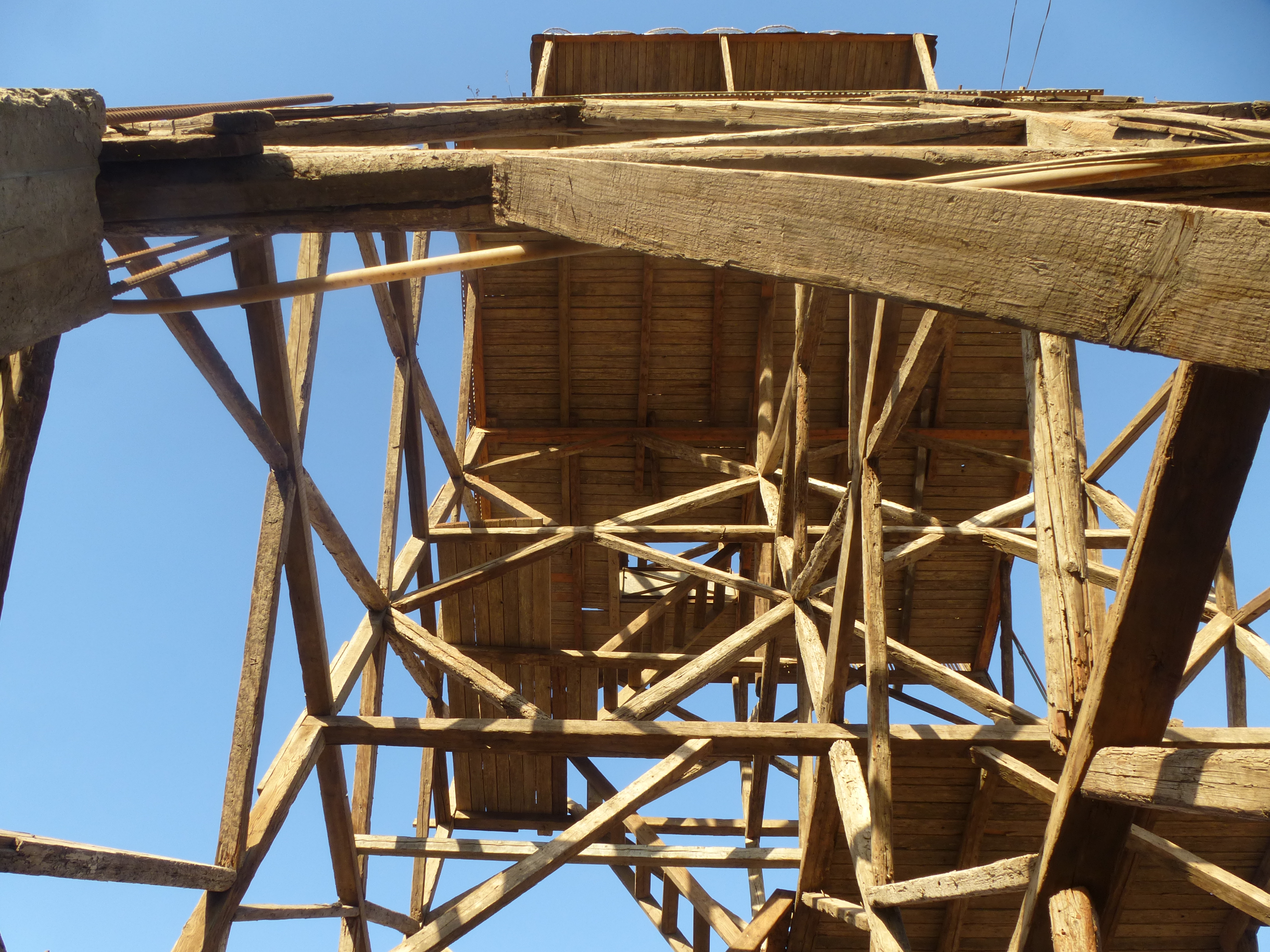
تقاطعَ الأفقُ عند منطقةِ منشأة ناصر بالقاهرة عدة أبراج متناثرة خشبية طويلة يمتدونَ من أسطحِ نحوَ السماءِ. هناكَ أكياسُ قمامةٍ ملقاةٌ في ظلِ تلك الأبراج، شهادةٌ على عامل الناس الذين يعيشونَ بهذا الحي.
صعدتُ احدًا الابراجِ الاسبوعَ السابقَ مع وسيم، صاحبُ أليهِ. كنت أُحاولُ لا أنظر للأسفل، عندما أتسلق عشرة سلالم نحو الشمس التي كادَ تبدأُ تغربُ. خرجَ راسي إلي أعلى الطابق ليجد عشرات من الأقفاص خشبية، مطلية بالأصفر و الأخضر، و كل أحد منها داخلها حمامة، ملونة أيضًا بلون مختلف.
«دي الأنجليزي الأحمر» قال لي وسيم عندما يسحب غطاء أحد الأقفاص، و يشور إلى الحمامة التي رفرفت بجناحيها في أبصاري. و قال لي وسيم كثيرا من أسامي انوع حمام مختلفة، ليس بمقدوري أفكار أي أحد منها ألان، غير التي اتسمت بأسم إنجلترا.
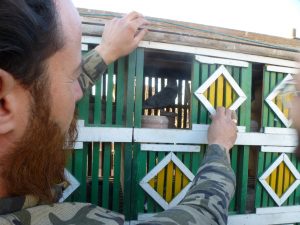
الساعة الخامسة هي وقت ليطلق الحمام من الأقفاص حول منشية ناصر. فتح وسيم الأقفاص من الجدار الغربي من برجه، و طيرت الحمام منها في الريح. كررَ نفس الفعل في كل الأنحاء، و ملّئت السماء من حولنا بنقاط سوداء صغيرة، أمثلا الحمام في الجو.
بدأ وسيم و صديقه رماني يصرا و يلوحا علما, قصاصةَ كيس بلاستيك بقوة. رحى رماني عدة اسطوانات المزيكة نحو سرب الطيور.
«كده هيفضلوا يطيرو» قال لي وسيم. لم نتحدث الكثير، أذا كانَ متركز علي هويته. كان بوسعه يفرق بين حمامه و حمام أحد من الأبراج الآخر، على رغم من أن يطيره بعيد عن ممرة بصتي. «ممكن يسرقو حمامة من سرب أخر، و يخليها ترجع معهم» قال لي، يشرح هدف المسابقة مع أصحاب حمام اخر.
عندما نزلتُ من البرج، كانت الليلة مظلمة.
لقد أراني وسيم غرفة مليئة حمام في منزله والتي لا يجعلها تطير مع الباقي. «فيه كام واحد» سألتُ له. «العداد مش الفكرة» قال لي.
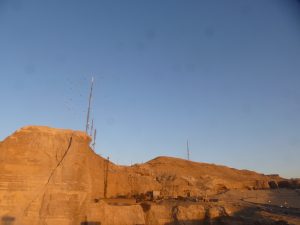 هذه هوايته، شغفه، استراحته من العامل. تتقدم للواحد العايشة بمنشية ناصر كثيرا من المشاكل.
هذه هوايته، شغفه، استراحته من العامل. تتقدم للواحد العايشة بمنشية ناصر كثيرا من المشاكل.
تنحدرَت غالبيةُ الأسر في هذه المنطقة من جنوبِ مصر، في سوهاج، قنا، و اسيوط، و نقلوا إلي القاهرة أثناء الحربِ العالميةِ الثانية، حيث أصبحَت أوضاعُ الزراعةِ هناك صعبًا. أستقرَت المجتمعات المهاجرة في جميع أنحاء شرق القاهرة، و بدأوا يبحثونَ عن العاملِ. بدأت تتجول المنازل، و تطلب بقايا الطعام ليكلينَ حيواناتها.
لكن لم يكونوا سكان القاهرة معتادينَ على فرز النفايات، فكانوا يطعونَهم محتوى القمامة بأكمله، و بهذا السبب، بدأَت الناسُ في تجارة المواد التي وجدتها داخل القمامة، وصبحَت الناسُ معروفةَ بأسم «الزبالين» بالهجة المصرية.
مرَت السنونَ، و وجهوا الزبالين تعلمات الحكومة، يعمرونَ ليبذحو كل الخنازير الذي رعاياها، على رغم من أن الخنازير كانوا يأكلون القمامة الطبيعية، و يقيمون أن الزبالين يستطيعوا يوعدوا أستخدام نسبة عالية من القمامة التي جمعوها. وجهت أيضا منافسة من الشركات الخاص، التي الحكومة بدأت تديها عقود في قطع القمامة، خافضا دور الزبالين التي عاملون بشكل غير رمسي.
لكن لم منعت هؤلاء الظروف الصعبة أن بعض الزبالين استطيعو يربحوا. يجمعَ بعض العملونَ الاشياء من سكان المدينة، ينقلوها لمنشية ناصر و ينفوها إلى أصناف المواد.
يدفع التجار هذه الإنتاج إلى شركات، و وسيم واحد من التجار. و بعد مراته و اطفاله، يصرف الأرباح من تجارة البلاستيك في هوايته – تربية الحمام.
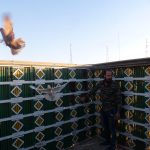 A scattered number of tall wooden towers break up the skyline in Manshiyet Nasser, Cairo, reaching into the sky from the rooftops. Sacks of rubbish rest in the shadow of the towers, tribute to the trade of the people who live in this neighborhood. I went up one of the towers last week with its owner, Wassim. I tried not to look down, as I climbed up ten tall ladders towards the sun, which was just beginning to set. Poking my head out onto the tallest floor, I found scores of wooden cages, painted yellow and green, and in each one a different pigeon, of equally varied colors.
A scattered number of tall wooden towers break up the skyline in Manshiyet Nasser, Cairo, reaching into the sky from the rooftops. Sacks of rubbish rest in the shadow of the towers, tribute to the trade of the people who live in this neighborhood. I went up one of the towers last week with its owner, Wassim. I tried not to look down, as I climbed up ten tall ladders towards the sun, which was just beginning to set. Poking my head out onto the tallest floor, I found scores of wooden cages, painted yellow and green, and in each one a different pigeon, of equally varied colors.
“This one’s an English Red,” Wassim told me, pulling back the cover of one of the cages, and pointing to the pigeon which flapped its wings inside as I looked on. Wassim told me a bunch of names, each belonging to a different type of pigeon, and I can’t remember any except the one named for England!
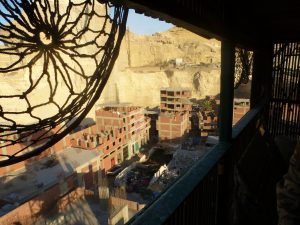 Five o’clock is time to set the pigeons free across Manshiyet Nasser. Wassim opened the cages on the west-facing wall first, and the pigeons flew out into the air. He repeated the process on each side of the tower, and the sky around us filled with black dots, each representing a pigeon in flight.
Five o’clock is time to set the pigeons free across Manshiyet Nasser. Wassim opened the cages on the west-facing wall first, and the pigeons flew out into the air. He repeated the process on each side of the tower, and the sky around us filled with black dots, each representing a pigeon in flight.
Wassim and his friend Romany began to whistle and wave a flag, made out of an old bit of plastic sack. Romany span a few old CDs into the air, towards the flock of birds. “That way they’ll stay flying longer,” Wassim told me. We didn’t talk a lot as Wassim was focussed on his pursuit. He could identify his pigeons in flight, and tell them apart from the birds which came from other towers, even though they were flying far out of the reach of my vision. “They might steal a bird from another person’s flock, and get it to come back with them,” explaining the aim of the contest with other pigeon owners in the area.
When we came back down from the tower, it was already dark. Wassim showed me a room in his house filled with other pigeons, that he doesn’t allow to fly with the others. “How many are there,” I asked, “How many there are isn’t the point,” he replied.
 This is his hobby, his passion, and his rest from work. Life in Manshiyet Nasser can present you with lots of challenges. Most families in this area are originally from south Egypt: Qena, Sohag, and Assiut, and they moved to Cairo during the Second World War, when the agricultural conditions became difficult. The community settled around east Cairo, and began looking for work. They began to tour the houses, asking for leftover food to give to their animals. But the residents of Cairo weren’t used to separating out their rubbish, and used to give them the whole bag. As a result, they began to trade the materials they found in the rubbish, and they became known as the “Zabaleen,” which means rubbish-workers in Egyptian Arabic.
This is his hobby, his passion, and his rest from work. Life in Manshiyet Nasser can present you with lots of challenges. Most families in this area are originally from south Egypt: Qena, Sohag, and Assiut, and they moved to Cairo during the Second World War, when the agricultural conditions became difficult. The community settled around east Cairo, and began looking for work. They began to tour the houses, asking for leftover food to give to their animals. But the residents of Cairo weren’t used to separating out their rubbish, and used to give them the whole bag. As a result, they began to trade the materials they found in the rubbish, and they became known as the “Zabaleen,” which means rubbish-workers in Egyptian Arabic.
As the years passed, the Zabaleen faced a number of government orders, demanding that they slaughter their pigs to prevent the spread of viruses, despite the fact that the pigs ate most of the organic waste, allowing them to recycle a very high percentage of the rubbish. They also faced harsh contest with private companies, who were granted government contracts in the waste sector, and reducing the role of the Zabaleen, who work informally.
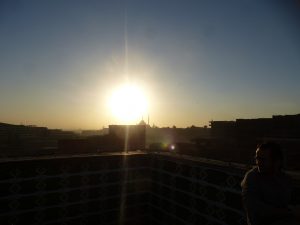 Yet these conditions haven’t prevented some of the Zabaleen from success. Some collect waste from the city’s residents, others separate it, and some trade in the materials they find. The traders sell these materials to companies, and Wassim is one of these traders. And after his wife and children, he spends his profits on his passion – raising pigeons.
Yet these conditions haven’t prevented some of the Zabaleen from success. Some collect waste from the city’s residents, others separate it, and some trade in the materials they find. The traders sell these materials to companies, and Wassim is one of these traders. And after his wife and children, he spends his profits on his passion – raising pigeons.
